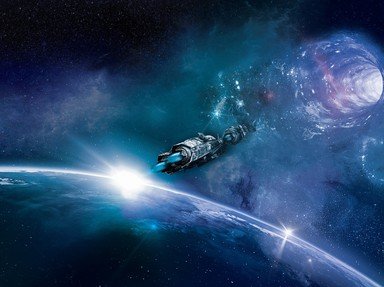Quiz Answer Key and Fun Facts
1. If you can come up with the last line of this quatrain then you'll arrive at the title of one of the best(er) SF novels ever written:
"Gully Foyle is my name
And Terra is my nation;
Deep space is my dwelling place,
______________________"
2. This novel is an old-fashioned Space Opera that won its alliteratively-named author a Hugo Award in 1993. It's part of his "Zones of Thought" series, and tells how a small group of people outwit a ghastly super-intelligence that's taking over the galaxy - although (spoiler alert!) their eventual victory comes at an horrendous cost. What's the title of this adventure-packed novel?
3. China Miéville is a British author who produces stories that are a kind of magic/Steampunk mixture. His second novel was set in the city of New Crobuzon, where a scientist accidentally lets loose an horrific flying monster called a slakemoth. It doesn't end happily. Despite this, the novel was nominated for both the Nebula and the Hugo "Best Novel" awards in 2002. What's the title of this very scary book?
4. "Alternative History" is a sub-genre of SF, attempting to answer questions of what life would look like if something different had happened in history. This very English novel, published in 1968, is often considered the best of this type. It describes a world in which Queen Elizabeth I was assassinated in 1588, leading to the success of the Spanish Armada's invasion of England. Enough dancing around - what's the title of this lyrical novel?
5. This Scottish author - also known as a crime writer - wrote a series of nine books set in a galaxy mostly controlled by "The Culture", sentient AIs that control worlds and spaceships. The first book in the series, published in 1987, describes a group's attempt to rescue a wounded Mind from a graveyard planet while facing opposition from an enemy alien race. What's the title of this book, taken from T S Eliot's "The Waste Land"?
6. It seems to me that apocalyptic "End of the World" novels are becoming more common and more popular. Published in 1949, this novel was one of the earliest examples and one of the best. The lead character survives an epidemic that wipes out most of humanity, and the story relates his experiences as, despite his best efforts, the survivors descend into barbarism. What's the title of this book?
7. Another British SF author who died too young, John Brunner wrote in a variety of genres but concentrated on the environmental effects of over-use of resources and overpopulation. His 1969 Hugo-winning novel created a range of characters to illustrate the problems caused by the latter; its title references a method of measuring this. What's the title of this novel?
8. When I was younger, Arthur C Clarke was one of my favourite authors. This novel, published in 1956, depicts life on Earth at least two-and-a-half billion years in the future, when humanity appears to be confined to one city, controlled by an AI. The entire population undergoes limitless reincarnations - except for Alvin, who has appeared from nowhere and is unique. He goes against his fellow-citizens' isolationism and sets out to explore Earth and then the Galaxy. What's the title of this book?
9. I've always had a soft spot for "cyberpunk", an SF sub-genre usually set in a dystopian urban environment and combining high tech and lowlife - think "Bladerunner", for example. William Gibson is the high prophet of the genre, and one of his best novels, written in collaboration with Bruce Sterling in 1990, describes life in London in 1855 - but a London in which Charles Babbage's first mechanical computing machine has worked. What's the title of this book?
10. Another "Alternative Universe" classic dating from 1953 portrays a North America in which the Confederacy won the Battle of Gettysburg. The book, set in the subsequent mid-20th Century, depicts a booming Confederacy and an impoverished Union. But then an historian wishing to study Gettysburg using a time machine makes a dreadful mistake on the battlefield - and the rest is new history. What's the title of this book?
Source: Author
Southendboy
This quiz was reviewed by FunTrivia editor
looney_tunes before going online.
Any errors found in FunTrivia content are routinely corrected through our feedback system.

